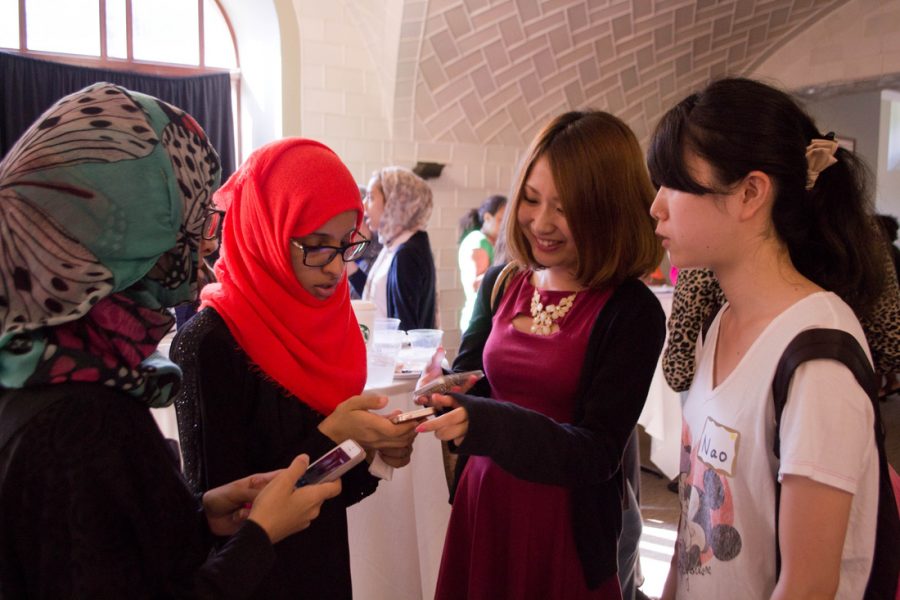Chatham is currently hosting 180 students from 31 countries, including two countries that partnered with Chatham for the first time, Finland and Laos. “International students help create a diverse and stimulating community at Chatham,” study abroad coordinator Karin Chipman said. “This fall, we welcomed about 60 new international students.”
International Student Services Coordinator Vivian Yamoah said this year has seen the largest number of international students, which has steadily grown in the last few years, both at Chatham and across the country. It is hard to know exactly why the sudden increase in exchange students and English Learning Program students, but it might have to do with Chatham’s recent offering of additional levels within the English Learning Program.
Midori Hasegawa, a Japanese Gateway student who settled in Pittsburgh, picked Chatham for its small size and central location. Communications student Karina Menezes commented about the size as well, comparing Chatham’s 2,000 undergraduate students to her university in Brazil with over 30,000 students.
“Chatham has science labs, good teachers, a dark room for photography class to develop film, great computers – and Brazil has old computers and not all the [software] programs we need,” Menezes said. In comparing Chatham to the University of Para in Brazil, she said even though students do not pay tuition, they pay out of pocket for amenities not covered by the university. Menezes appreciated that the cost of education at Chatham includes other campus services.
Gateway student Midori Hasegawa, a widow, lost her parents, but has plans to return to her native country, Japan. She had observed that many of her teachers in Japan would push their views on students. Hasegawa feels that many Japanese children do not know how to think critically, but she wants to help by changing the Japanese education structure.
Back in Cambodia, Chorlida Leng volunteered in schools and small villages to educate Cambodian citizens about human rights. A Cambodian student majoring in political science as part of a pre-law program, Leng expressed interest in Chatham’s volunteer opportunities such as “growing trees and cleaning schools.”
How easy is it to make new friends? “I made new friends here, mostly because the school is small,” Hasegawa said. She added that Chatham’s size makes it easier to communicate with teachers as well as fellow students. “Classmates are very helpful especially [with preparing] for tests,” she said. “[My American friend] helps me in statistics. Sometimes I tell her ‘last week’s test score was not so good.’ And she tells me, ‘Midori, it’s ok!’”
Leng found it difficult to make friends at first. When class ended, students left right away and Leng didn’t get a chance to strike up conversations until a few weeks into the semester. She has since made friends, and Leng enjoys getting together with them.
For Hasegawa, the most meaningful connection she made at Chatham was with the director of undergraduate admissions, Mary Scott. Scott left Chatham for a position at another university, but Hasegawa said that while at Chatham, Scott treated every email she sent with equal importance. Although she does not work at Chatham anymore, Hasegawa expressed gratitude for the sensitivity Scott showed and time spared in helping her get acclimated to school.
Some of the students discussed being homesick. Menezes said she was homesick for the first three months of her stay in Pittsburgh. “There is a river in Brazil outside my university and the rivers in Pittsburgh remind me of it. It’s comforting and familiar, when I got homesick I used to go downtown and walk near the rivers.”
Nao Miyoshi, a Japanese exchange student in the English Learning Program (ELP) at Chatham, said she misses Japanese food. She decided to make udon, Japanese noodles, for her Japanese and Korean friends. Leng said she skypes with her family every week.
The language barrier can be a problem. Leng mentioned that it’s hard to keep up with the pace of learning with an unfamiliar language. Menezes tries to avoid talking in Portuguese while studying abroad. “I really want the opportunity to improve my English. I feel better not talking Portuguese because I have the rest of my life to speak my own language.”
The Office of International Affairs helps international students settle in at Chatham. “They took us to bank and showed us around and they hold workshops for us.” Leng said Vivian Yamoah helped her get a cell phone, arrange a bank account, schedule classes, and adapt to life at Chatham.
Yamoah advises Menezes as well. “When I have problems or need to talk to someone I just contact her. She’s understanding, helpful,” Menezes said. The Office of International Affairs provided her with everything she needed even when she interned in Pittsburgh this past summer.
Chipman and Yamoah split advising responsibilities based on the type of program that students use. Yamoah advises government-sponsored exchange students, while Chipman advises students who arrive through the study abroad system, and Linh Phung, the ELP coordinator, advises exchange students who study English.
The Office of International Affairs provides opportunities to help students acclimate through programs such as a comprehensive orientation, workshops, and targeted activities. “The Office of International Affairs is here to support our international students by providing information, services and activities, ranging from English language tutoring to the Global Mixer,” said Chipman.
Miyoshi enjoyed the Global Mixer. “I made a lot of friends there,” she said. “I don’t have many opportunities back in Japan to interact or meet other students from different countries.”
“I think that Chatham tries to make a connection among students with all the different events they offer: outdoor activities, meetings,” Menezes said. “In Brazil the universities don’t support student activities, students have to make their own.”


